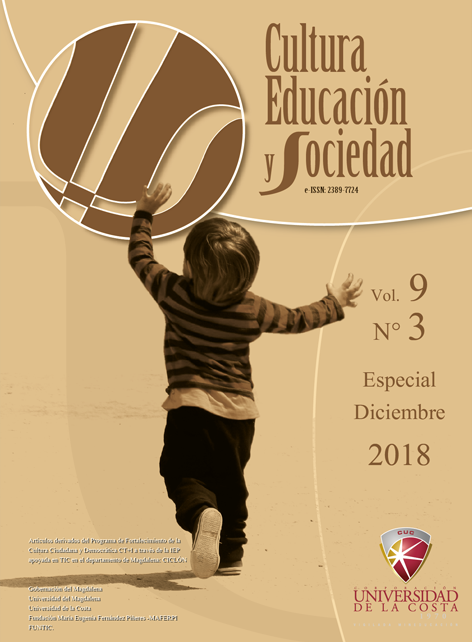Importance of the socio-affective motivation of teachers to students during the pedagogical practice in the different areas of knowledge
DOI:
https://doi.org/10.17981/cultedusoc.9.3.2018.29Keywords:
Coexistence, Motivation, innovation, socio-affectiveAbstract
The present proposal arises from a research on the psychopedagogical didactic strategy for the innovation of the teaching practice in the Departmental Education Institution of Salamina - Magdalena, before the need to innovate the teaching practices in the educational institutions. Taking into account the importance of the relationship between the teacher and the student, their practice in the classroom and their relationship with the affective partner to design and characterize their work. The methodology used was of a qualitative nature and mainly covers action research, from a descriptive, exploratory design. Techniques were used such as: observation, participants and field diary. An intentional or convenience sampling was carried out, choosing students who had difficulties in reading and writing for each course, the sample consisted of two hundred and thirty (230) students with ages ranging between four (4) and twelve (12) years , of grades between preschool and fifth grade. It was finally shown that through the teacher-student relationship, it is possible to intervene in a positive way in the correct development of learning, thus raising the quality of education and the school climate.
Downloads
References
Alliaud, A. (2004). La experiencia escolar de maestros “inexpertos”. Biografías, trayectorias y práctica profesional. Revista Iberoamericana de Educación, 34(3), 1-11.
Barrios Espinosa, M. E. (1997). Motivación en el aula de lengua extranjera.
Castro-Carrasco, P. J., General, F., Jofré, R., Sáez, N., Vega, Á., & Bortoluzzi, M. (2012). Teorías subjetivas de profesores sobre la motivación y sus expectativas de éxito y fracaso escolar. Educar em Revista, (46).
Coll, C. (1984). Estructura grupal, interacción entre alumnos y aprendizaje escolar. Infancia y aprendizaje, 7(27-28), 119-138.
Cuadrado, I., & Fernández, I. (2008). ¿Cómo intervienen maestros y profesores para favorecer el aprendizaje en secundaria? Un estudio comparativo desde el análisis del discurso. Infancia y Aprendizaje, 31(1), 3-23.
De Tejada Lagonell, M. (2010). Evaluación de la autoestima en un grupo de escolares de la Gran Caracas. Liberabit, 16(1), 95-103.
Duarte, D. (2003). Ambientes de aprendizaje: una aproximación conceptual. Estudios pedagógicos (Valdivia), (29), 97-113.
Fernández, O., Luquez, P., & Leal, E. (2010). Procesos socio-afectivos asociados al aprendizaje y práctica de valores en el ámbito escolar. Telos, 12(1).
Ferreiro Gravié, R. (2007). Una visión de conjunto a una de las alternativas educativas más impactante de los últimos años: El aprendizaje cooperativo. Revista electrónica de investigación educativa, 9(2), 1-9.
García Cabrero, B. (2009). Dimensiones afectivas de la docencia. Tema del mes.
Gil, N., Blanco, L. J., & Guerrero, E. (2005). El dominio afectivo en el aprendizaje de las matemáticas. Una revisión de sus descriptores básicos. Revista iberoamericana de educación matemática, 2(1), 15-32.
Lozano González, L., González-Pienda, J. A., Núñez Pérez, J. C., Lozano Fernández, L. M., & Álvarez Pérez, L. (2001). Estrategias de aprendizaje, género y rendimiento académico.
Madrigal, C. M., Mujica, A. D., Tamarín, C. C., Olave, C. N., & Carrasco, I. B. (2011). Clima social escolar en el aula y vínculo profesor-alumno: Alcances, herramientas de evaluación, y programas de intervención. Revista Electrónica de Psicología Iztacala, 14(3), 70-84.
Maquilón Sánchez, J. J., & Hernández Pina, F. (2011). Influencia de la motivación en el rendimiento académico de los estudiantes de formación profesional. Revista electrónica interuniversitaria de formación del profesorado, 14(1).
Morales, S. A. M. U. E. L. (2012). Estudio del nivel de empatía y motivación de logro de los alumnos de la carrera de odontología de la Universidad de Concepción. Rev. Educ. Cienc. Salud, 9(2), 121-125.
Rosas Lobo, E. Z. (2007). Las estrategias socio-afectivas y su efecto motivador en situaciones de aprendizaje de una lengua extranjera. Paradigma, 28(2), 181-196.
Trianes Torres, M. V., & García Correa, A. (2002). Educación socio-afectiva y prevención de conflictos interpersonales en los centros escolares. Revista Interuniversitaria de Formación del profesorado, (44).
Downloads
Published
How to Cite
Issue
Section
License
Copyright (c) 2018 CULTURA EDUCACIÓN Y SOCIEDAD

This work is licensed under a Creative Commons Attribution-NonCommercial-NoDerivatives 4.0 International License.
![]()
Creative Commons 2020 CULTURA EDUCACIÓN Y SOCIEDAD
This article is under international license Creative Commons Reconocimiento-NoComercial-SinObrasDerivadas 4.0.
The published articles are the sole responsibility of their authors and do not necessarily reflect the opinions of the editorial committee.
CULTURA EDUCACIÓN Y SOCIEDAD respects the moral rights of its authors, who assign to the editorial committee the patrimonial rights of the published material. In turn, the authors inform that this work is unpublished and has not been previously published.
All articles are under a:
Licencia Creative Commons Atribución-NoComercial-SinDerivadas 4.0 Internacional.
![]()


 English
English
 Español (España)
Español (España)




_12.53_.27_p_. m_._3.png)





_12.57_.35_p_. m_._3.png)
_12.50_.37_p_. m_._3.png)



